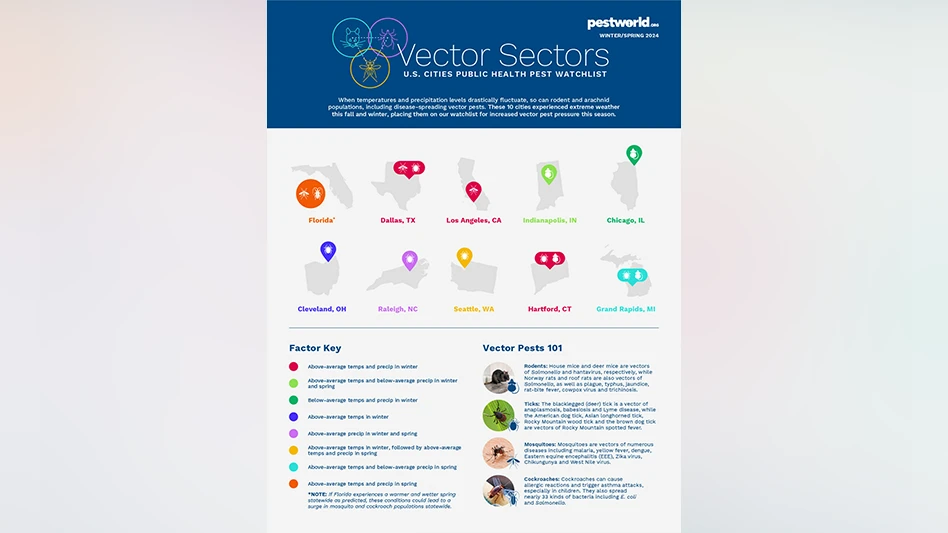
NPMA
FAIRFAX, Va. - The National Pest Management Association (NPMA) shared its bi-annual Vector Sectors list, unveiling the top 10 U.S. cities at heightened risk for increased vector pest pressure throughout the remainder of winter and into spring.
The seasonal report includes an alert for Florida, underscoring concerns as four cities in the state experienced an unseasonably warm and wet winter, which is predicted to increase mosquito and cockroach activity in homes. The Centers for Disease Control and Prevention (CDC) notably reports a spike in disease epidemics from viruses spread by mosquitoes, including recent dengue outbreaks in many countries worldwide.
"With springtime and warm weather on the horizon, many Americans are itching to get outside," said Dr. Jim Fredericks, senior vice president of public affairs for NPMA. "As pest experts, we're utilizing our Vector Sectors™ list to help consumers understand the connection between weather conditions and pest behavior and empowering them with tools to safeguard not just their homes but, crucially, their health."
In the past decade, the CDC reports not only an increase in the number of dangerous vector-borne diseases, such as dengue and Lyme disease, but also the geographic spread of the vectors.
"Some pests can leave more than an itchy bite mark," said Dr. Jorge Parada, medical advisor for NPMA with a focus on infectious disease. "Vector pests can spread pathogens to humans through their bites, making prevention especially important to help reduce transmission of dangerous and potentially deadly diseases."
The top 10 U.S. cities named to NPMA's Vector Sectors list include:
- Chicago: A warm start to the winter combined with below-average temperatures and precipitation may force rodents into structures to seek shelter and water.
- Cleveland: With the second warmest December recorded this year, tick populations may extend their stay through the winter months and into spring if warm temperatures persist.
- Dallas: Unseasonably warm and wet winter months could lead to an increase in tick activity as overwintering adults remain active when temperatures remain above freezing. Meanwhile, increased rainfall could create more standing water, creating ideal conditions for mosquitoes into the spring.
- Florida: If Florida experiences a warmer and wetter spring statewide as predicted, these conditions could lead to a surge in mosquito and cockroach populations across a number of its major cities, making it a contender for the list.
- Grand Rapids: Warmer-than-usual weather and below-average precipitation are forecasted this spring. This means ticks may be more active on warmer days, and rodent activity may increase as they seek water in these drier conditions.
- Hartford: Above-average temperatures and precipitation will lead to more foliage and underbrush growth, providing ideal conditions for tick and rodent populations to persevere throughout winter.
- Indianapolis: A warm and dry winter that continues into spring may lead to an increase in rodent sightings as rats and mice will push their way indoors to seek water sources.
- Los Angeles: Mosquito populations could continue to thrive well into the winter months if warmer temperatures and above-average rainfall persist as forecasted.
- Raleigh: Following the wettest December on record, a rainy spring is on the horizon. This combo could result in a bump in tick populations as abundant rainfall encourages plant growth, providing ticks with more cover and opportunities to latch onto a host.
- Seattle: If unseasonably warm conditions persist, brace for sustained tick activity throughout the winter months. And, with spring forecasts calling for mild temperatures and increased rainfall, there's no relief in sight as tick populations could continue to increase.
Latest from Pest Control Technology
- Donny Oswalt Shares What Makes Termites a 'Tricky' Pest
- Study Finds Fecal Tests Can Reveal Active Termite Infestations
- Peachtree Pest Control Partners with Local Nonprofits to Fight Food Insecurity
- Allergy Technologies, PHA Expand ATAHC Complete Program to Protect 8,500 Homes
- Housecall Pro Hosts '25 Winter Summit Featuring Mike Rowe
- Advanced Education
- Spotted Lanternflies, BMSBs Most Problematic Invasive Pests, Poll Finds
- Ecolab Acquires Guardian Pest Solutions





